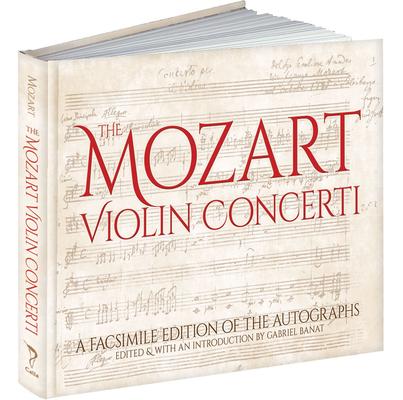Only about a tenth of Mozart's works were printed during his lifetime, the rest having been published without the benefit of his supervision. This long-awaited edition of the autograph score offers a rare opportunity to see Mozart's violin concertos according to the composer's intentions. Thanks to the well-preserved condition of the original manuscripts and Mozart's legible handwriting, these reproductions of his scores can be used for study, reference, and performance. In addition to the five works ― Concerto No. 1 in B Flat, K. 207; Concerto No. 2 in D, K. 211; Concerto No. 3 in G, K. 216; Concerto No. 4 in D, K. 218; and Concerto No. 5 in A, K. 219 ― the volume includes two additional pieces, the Adagio in E, K. 261, and the Rondo in B Flat, K. 261a.
The first edition of this volume was published in a limited edition in 1986 and has been virtually unobtainable for many years. Two informative introductory essays by violinist Gabriel Banat, who located the manuscripts, missing since World War II, supplement the collection: the first one traces Mozart's relationship with the violin, and the other examines the history and importance of these manuscripts, thought to have been forever lost. This outstanding edition offers teachers, violinists, conductors, musicologists, and Mozart enthusiasts an extraordinary chance to possess a score reproduced from the master's own hand.

The Mozart Violin Concerti: A Facsimile Edition of the Autographs
Only about a tenth of Mozart's works were printed during his lifetime, the rest having been published without the benefit of his supervision. This long-awaited edition of the autograph score offers a rare opportunity to see Mozart's violin concertos according to the composer's intentions. Thanks to the well-preserved condition of the original manuscripts and Mozart's legible handwriting, these reproductions of his scores can be used for study, reference, and performance. In addition to the five works ― Concerto No. 1 in B Flat, K. 207; Concerto No. 2 in D, K. 211; Concerto No. 3 in G, K. 216; Concerto No. 4 in D, K. 218; and Concerto No. 5 in A, K. 219 ― the volume includes two additional pieces, the Adagio in E, K. 261, and the Rondo in B Flat, K. 261a.
The first edition of this volume was published in a limited edition in 1986 and has been virtually unobtainable for many years. Two informative introductory essays by violinist Gabriel Banat, who located the manuscripts, missing since World War II, supplement the collection: the first one traces Mozart's relationship with the violin, and the other examines the history and importance of these manuscripts, thought to have been forever lost. This outstanding edition offers teachers, violinists, conductors, musicologists, and Mozart enthusiasts an extraordinary chance to possess a score reproduced from the master's own hand.